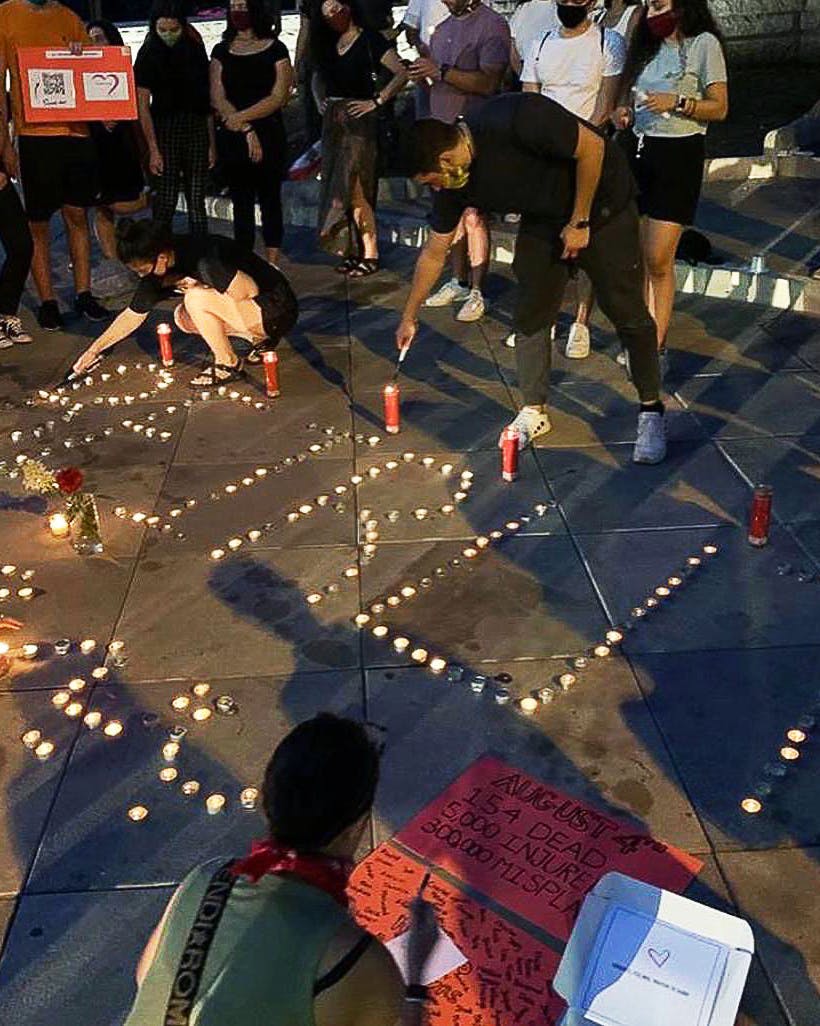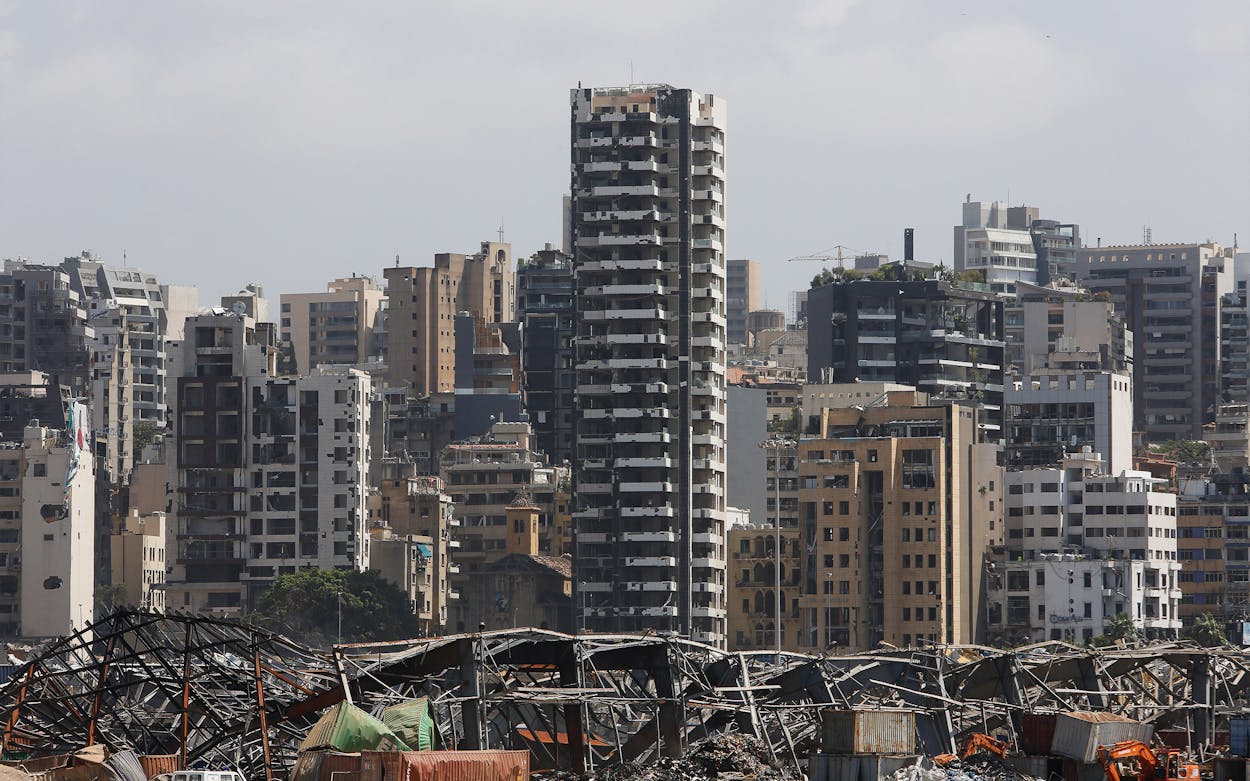When Rayan Eter, a pharmacy graduate student at the University of Texas at Austin, first watched the video of the explosion that leveled Beirut’s port on August 4, she stared at her phone in disbelief. “It looked like a scene out of a movie,” she said. Eter, who grew up in Tripoli, Lebanon, immediately began texting with Reem Salhab, Yara Hayek, and Jean Rahal—fellow members of UT’s Lebanese Cultural Organization—and an impassioned group chat ensued. Eventually, Eter and her friends would learn that the explosion, which was ruled an accident by investigators, killed at least 160 people, injured more than 5,000, and left 300,000 homeless.
“There was a twenty-four-hour period of just mourning and discussing our personal feelings about the event,” said Salhab, a public health graduate student from Batroun, a coastal city in North Lebanon. “We decided that we couldn’t not do anything.” The friends set up a GoFundMe account on behalf of their student organization, to be split between the Lebanese Red Cross and Beit el Baraka, an NGO that works primarily with the elderly and has been helping with food insecurity in Beirut for months. In just four days, the group had raised more than $6,000. The students are happy to be doing something, but their anger and grief over their country’s current state goes deeper than this singular tragedy.
Their fundraiser is just one of dozens of campaigns that have sprung up across Texas in the week since the deadly explosion, many of them started by members of the state’s large Lebanese population. An estimated 55,000 people of Lebanese descent live in Texas, which has the country’s fourth-largest Arab American population. Lebanese and Syrian immigrants began arriving in Texas around 1880 (under the Ottoman Empire, Lebanon and Syria were included within one administrative entity and were part of an area known as Greater Syria) and settled all across the state—from Orange on the Louisiana border in southeast Texas to the tiny Panhandle town of Canadian. Many prominent Texans have come out of the Lebanese community, including heart surgeon Michael DeBakey, clothing tycoon Joe Haggar, music impresario Clifford Antone, and Houston attorney Joe Jamail.
The majority of Lebanese Texans today live in the Houston area, which boasts a rich array of Lebanese cultural centers, restaurants, bakeries, and grocery stores—many of them concentrated in southwest Houston on Richmond and Hillcroft avenues. Many Lebanese Texans have close ties with family and friends back home, but with COVID-19 travel restrictions, getting back to Lebanon to help out is impossible for most, so the community has turned to online fund-raising. Kameel Atweh, a Lebanese expat and seminary graduate in southwest Houston, started a GoFundMe to raise money for Health Outreach to the Middle East, a Christian nonprofit that has set up mobile clinics in Beirut. “It kind of hurts that I can’t be there,” Atweh said. “I did the fundraiser because I can’t be cleaning the streets or giving people food or helping with whatever relief project.”

Other Texas-based Beirut fund-raising campaigns were started by expats who are trying desperately to get money to family members affected by the explosion. But it can be difficult to directly aid those who need it, in part because of limits on bank withdrawals in Lebanon. As a result, many are putting funds in the hands of NGOs and aid workers on the ground, Rahal, an electrical engineering grad student from Bikfaya, Lebanon, and part of the UT fund-raising team, told me.
“We didn’t want any money to go to the Lebanese government,” Rahal said. He adds that the U.S. dollar goes especially far in Lebanon right now.
Then there are the large nonprofits like the Amel Association, a Lebanese health-focused nonprofit with an office in Sugar Land. The group redirected a COVID-19–focused fundraiser it had established in April to deal with the aftermath of the explosion; it’s raised more than $71,000.
The August 4 explosion, caused by 2,750 tons of ammonium nitrate that had been sitting unmonitored in a warehouse at the Beirut port for more than six years, ripped through several neighborhoods of the capital and was heard as far off as Cyprus, 150 miles away. The event has drawn comparisons to two Texas disasters that were also caused by ammonium nitrate: the 1947 Texas City explosion—which remains the deadliest industrial accident in U.S. history—and the 2013 fertilizer plant explosion in West, twenty minutes north of Waco. Now the Beirut disaster has renewed calls in the U.S. to strengthen oversight of the chemical. Last year, the Trump administration’s EPA rolled back safety rules that were enacted after the West incident. Companies are no longer required to publicly disclose which types of chemicals are stored in their facilities or to do third-party audits in the wake of accidents.
The latest explosion couldn’t have happened at a worse time for Lebanon, which was already teetering on the edge as a result of its unstable government, an ongoing economic collapse, and the growing COVID-19 crisis. There have been angry protests in the past week—many Lebanese blame the government for the blast, especially after records showed that officials knew the dangers and still failed to act—and on August 10, the ruling party stepped down. Many people raising money to help Lebanon after the explosion also hope to raise awareness of their country’s overall predicament.
“It’s like in a boxing match, it’s the final punch,” said Wadih Elhajj, the president of the American Lebanese Cultural Center (ALCC), in Houston, of the port disaster. A nonprofit that offers Arabic classes on weekends and holds the largest annual Lebanese festival in the country (except this year, when it was a casualty of COVID-19), ALCC has raised more than $50,000 for the Lebanese Red Cross in the past week. Elhajj, who has family in the capital, including nieces who sustained minor injuries in the blast, says the group wanted to get funds to the people in his hometown as quickly as possible.
Whether they are recent expats, like Rahal, or arrived in Texas in the seventies, like Elhajj, the people I spoke with have strong ties to Lebanon, and many are struggling with something akin to survivor’s guilt. Rahal, 25, told me that, like many young Lebanese living in the U.S., he had hoped to return to Lebanon eventually, but doesn’t feel like it’s an option. “For many of us, we come here, we try to build something for the future, but then the ultimate goal is always to go back,” he said. “But what happened on Tuesday is like a dream shattering.” Though Atweh, 31, is happily settled in Houston and doesn’t have plans to return to Lebanon to live, he still hopes to get back there soon to see his parents and to aid in relief efforts. “Lebanon is my home country. It’s a big part of who I am,” he said.
On Wednesday, August 12, Houston mayor Sylvester Turner held an event paying tribute to Lebanon and the Lebanese community in Houston. City hall and the Montrose Bridge lights along U.S. Highway 59 were lit in red and green—the colors of the Lebanese flag—to show support for victims of the Beirut explosion. Members of the Lebanese community waved flags and had a moment of silence for the victims. Their grief over the explosion goes beyond having family or friends directly affected by the blast. “They’re our Lebanese brothers and sisters,” said Reem Salhab. “We don’t have to personally know them to feel that devastation and connection. We really took it hard.”








